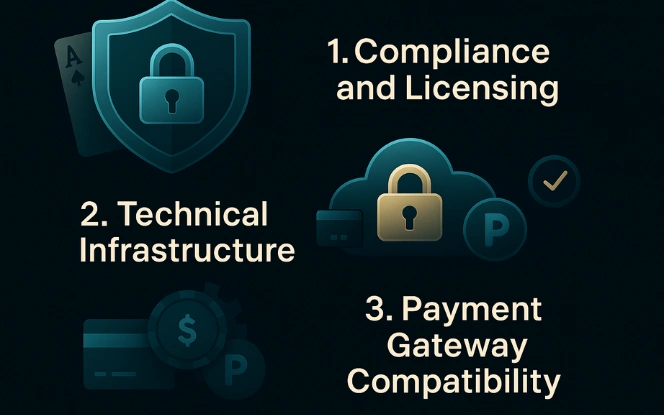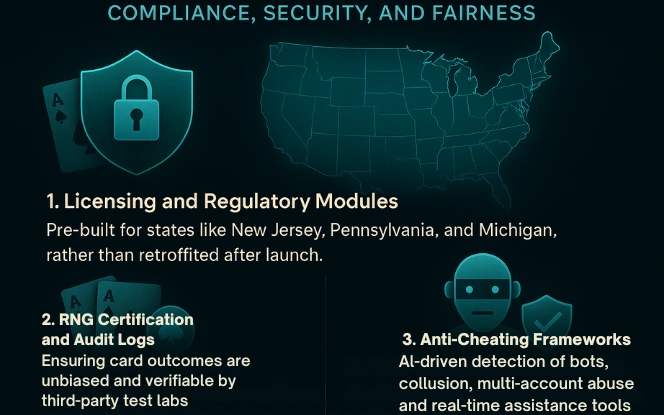Introduction
If you searched top online poker software providers USA, you are likely buying a platform. You are not buying poker study tools. Operators need online poker platform software that runs games, moves money safely, and supports audits.
This guide helps you compare vendors in 2026. It also gives you a due diligence script for demos.
How we evaluated: platform stability, game integrity controls, wallet and ledger safety, admin security, integration readiness, and SLA maturity. If a vendor claims something, ask for proof in product.
Top Poker Software Provider in USA in 2026

SDLC CORP
- $25 - $50/hr
- 10,000+
- 2015
- USA
- 4.7/5

GammaStack
- $25 - $50/hr
- 10,000+
- 2012
- Italy
- 4.5/5

Playtech
- $100 - $300/hr
- 50+
- 1999
- Global
- 4.6/5

EvenBet Gaming
EvenBet Gaming is known for delivering flexible poker software for both real-money and social platforms, with a mobile-first approach and white-label packages.
- $50 - $150/hr
- 100+
- 2004
- Global
- 4.5/5

BetConstruct
BetConstruct delivers all-in-one iGaming solutions including custom poker platforms with live dealer integration, gamification, and native app support.
- $40 - $120/hr
- 800+
- 2004
- Global
- 4.4/5

Connective Games
Specializing in poker-only software, Connective Games develops fully customizable platforms for UK operators, emphasizing user experience and regulatory readiness.
- $80 - $250/hr
- 150+
- 2005
- Global
- 4.8/5

SoftSwiss (now BGaming)
SoftSwiss offers white-label and crypto-based poker platforms that are UK-ready when hosted via local licensees.
- $40 - $100/hr
- 1,000+
- 2012
- Global
- 4.6/5

Creatiosoft
- $100 - $250/hr
- 700+
- 2012
- Global
- 4.4/5

EveryMatrix
- $100 - $250/hr
- 700+
- 2012
- Global
- 4.4/5

Capermint Technologies
- $100 - $250/hr
- 700+
- 2012
- Global
- 4.4/5
U.S. Poker Market Outlook 2026
How Regulation and Technology Drive Growth
The momentum toward full-scale iGaming legalization continues to grow as more states adopt regulated frameworks. This evolution is supported by both economic incentives and the advancement of technology — including AI-based player protection, blockchain-backed fair play, and secure multi-platform poker architecture.
The U.S. online gambling sector overall is projected to maintain double-digit growth throughout the decade. The table below outlines the industry’s market size trajectory and projected CAGR based on current research and market trends:
| Year | Estimated Market Size (USD Billion) | Annual Growth Rate (%) | Key Growth Drivers |
|---|---|---|---|
| 2024 | 5.12 | — | Legal expansion across major U.S. states |
| 2025 | 6.01 | 17.4 | Increased adoption of real-money poker platforms |
| 2026 | 7.12 | 18.4 | AI-driven fraud prevention and personalized gameplay |
| 2027 | 8.36 | 17.3 | Wider multi-state licensing and cross-platform support |
| 2028 | 9.74 | 16.5 | Blockchain-backed transactions and transparency systems |
| 2029 | 10.98 | 16.5 | Nationwide market maturity and regulatory clarity |
How to Choose the Right U.S. Poker Software Provider

Start with platform stability. A solid platform handles reconnections cleanly. It keeps game state consistent. It also isolates gameplay from payments, so wallet issues do not corrupt tables.
Next, validate wallet and ledger safety. Ask how the platform prevents balance drift. Ask how it records transaction trails. Also ask how approvals work for payouts. If the vendor cannot explain this clearly, you take risk later.
Then, validate game integrity. Ask how they detect collusion and bots. Ask how they detect multi-accounting. Also ask what evidence gets stored. You want hand history exports and risk event exports.
Finally, validate admin security and operations. Require RBAC and MFA for admins. Require audit logs for all privileged actions. Then ask about pen test cadence, patch policy, and incident response.
Use these due diligence questions in demos:
Ask, “Show admin audit logs for balance and payout actions.” Then ask, “Show the fraud workflow from alert to closure.” Next ask, “Show reconciliation reports and chargeback handling.” After that, ask, “Show exports for hand histories and risk events.” Finally ask, “Explain release control and rollback.”
Why SDLC Corp Leads the U.S. Poker Software Market in 2026
New Technology Trends Shaping the Industry

Key Technical Innovations by SDLC CORP in the US Market 2026
AI for Fraud Detection and Player Analytics
In 2026, AI systems are crucial for ensuring fairness and managing risk in online poker platforms. Providers increasingly deploy machine-learning models and anomaly-detection algorithms to monitor gameplay for signs of bots, collusion, and other irregular behavior.
These AI systems do more than flag suspicious actions they analyse patterns such as bet sizing, session frequency, device fingerprinting, and account history to build baselines of “normal” behavior and quickly identify deviations. For instance:
- A sharp increase in win-rate from a new account might trigger a review.
- Identical play patterns across multiple devices may indicate collusion.
- Rapid multi-location logins can suggest account takeover or bot usage.
By combining these insights with real-time alerts and automated holds or suspensions, platforms significantly reduce risk, protect player trust, and satisfy regulatory requirements. In this environment, AI-powered detection and analytics aren’t just optional they’re effectively mandatory for any U.S.-facing poker operation seeking compliance and longevity.
Web3 Integrations for Transparency
Blockchain and smart contracts are now transforming how poker providers deliver transparency and verifiable fairness. With distributed ledgers, every hand, bet, payout, and shuffle event can be stored immutably, auditably, and in some cases publicly.
Key features include:
- Smart contracts that automatically execute game rules and payouts without human intervention.
- Provably fair shuffles and outcome logs where a player or auditor can verify the process cryptographically.
- Immutable audit trails, ensuring that historical game data cannot be retroactively modified.
For U.S. operators, this level of transparency adds a layer of credibility: platforms can demonstrate fairness to regulators and players alike. In 2026, incorporating blockchain-based verification isn’t just a novelty it’s becoming a differentiator in regulated markets where fairness claims must be backed by evidence.
Real-Time Multiplayer Architecture
The modern U.S. poker market demands real-time, cross-platform multiplayer experiences capable of scaling for tens of thousands of concurrent players. This requires event-driven backend systems, cloud-native infrastructure, and low-latency network design.
Essentials of this architecture include:
- Event-driven microservices that handle individual player actions, shakes-hands, bets, and state updates efficiently.
- Distributed caching and message queues to synchronize game state across devices rapidly.
- Scalable cloud clusters that auto-scale on demand during peak tournaments or high-traffic windows.
- Cross-device compatibility ensures the same session flows seamlessly from desktop to mobile to tablet.
These capabilities are now standard expectations for U.S. poker platforms in 2026, where user experience is closely tied to retention and reputation. A provider that cannot guarantee lag-free real-time gameplay and seamless cross-device continuity risks being left behind.
Conclusion
Explore more of our services:
FAQs
What defines a top poker software provider in the U.S.?
A leading U.S.-focused provider combines deep technical expertise, compliance readiness for state regulation, and a strong track record of scalable real-money platforms. Key differentiators include certification of RNGs, anti-fraud systems, modular licensing support, and proven multi-state launches.
How much does U.S. poker software development cost in 2026?
Costs vary widely depending on features, platform, and whether it supports real-money play. Basic real-money poker systems start around $50,000 and can exceed $500,000 for full-scale platforms with advanced features and multi-state compliance. Additionally, even simpler white-label or social-play versions may begin in the $10,000 to $30,000 range.
Which technologies are essential for compliance and performance?
Can poker software be integrated with payment gateways like PayPal?
Yes — leading poker software providers support major U.S. payment solutions (e.g., PayPal, ACH, debit/credit cards) in a way that meets regulatory standards. They typically handle PCI-DSS compliance, integrate fraud-prevention modules, and allow withdrawals and deposits in line with state regulations.




